Introduction
An important fundamental factor that affects a currency exchange rate is the interest rate of the currency. Higher interest rates attract investors to invest in a given currency pair while lower interest rates could lead to higher inflations. This work has examined in detail the major impact of the interest rate on the forex market to guide beginners who wish to trade forex using any of the forex brokers for beginners today.
Meaning of interest rates
Interest rate refers to the amount charged by a lender to a borrower for the use of money, expressed as a percentage of the amount borrowed over a certain period, usually a year. When a borrower takes out a loan or opens a savings account, the interest rate is used to calculate the amount of interest that the borrower will pay or receive.
Interest rates play a significant role in the economy as they influence borrowing, savings, and investment decisions. Higher interest rates generally make borrowing more expensive and encourage people to save, while lower interest rates make borrowing cheaper and discourage savings.
The interest rate on a loan or savings account can be fixed or adjustable. A fixed interest rate means that the interest rate remains the same over the life of the loan or deposit, while an adjustable interest rate means that the rate can change over time, usually in response to changes in market conditions or the Federal Reserve’s monetary policy.
In addition to impacting individual borrowing and savings decisions, interest rates also have a broader impact on the economy. For example, when the Federal Reserve raises interest rates, it can slow economic growth and reduce inflation. Conversely, when the Federal Reserve lowers interest rates, it can stimulate economic growth and increase inflation.
Click here – 6 Tips for Business Professionals to Standout at Any Job Level
Major ways in which the interest rates affect the Forex Market?
The interest rate is a key determinant of the Forex market, as it affects the value of currencies relative to one another. Here are the major ways in which interest rates impact the Forex market:
- Determining the supply and demand for a currency: Higher interest rates make a currency more attractive to foreign investors, increasing its demand and strengthening its value. Conversely, lower interest rates decrease demand for a currency, making it weaker.
- Central bank monetary policy: Interest rates set by central banks, such as the Federal Reserve in the US or the European Central Bank, influence the direction of their respective currencies in the Forex market.
- Inflation: Interest rates are adjusted to maintain price stability, and inflation is a key factor that central banks consider when setting interest rates. If inflation is high, interest rates are likely to rise, boosting the value of the currency.
- Investment decisions: Interest rate differentials between two countries can impact the relative demand for their currencies. For example, if one country has a higher interest rate than another, investors may choose to hold assets in the country with higher interest rates, leading to an increase in demand for its currency.
- Carry trade: The carry trade is a popular strategy in the Forex market that involves borrowing in a low-interest rate currency and investing in a high-interest rate currency to benefit from the interest rate differential. Interest rate changes can significantly impact the profitability of carry trades.
In conclusion, the interest rate is a crucial factor that drives the Forex market, affecting currency values, central bank policy, inflation, investment decisions, and carry trade strategies. Understanding how interest rates impact the Forex market is critical for making informed trading decisions.
Click here – How Digital Marketing Can Take Your Business To The Next Level
